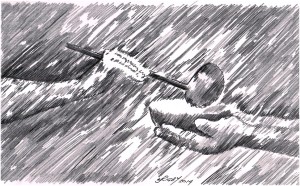In 2005 I came across this word picture in a novel of what it’s like to receive mercy:
The world will give you that once in a while, a brief timeout; the boxing bell rings and you go into your corner, where somebody dabs mercy on your beat-up life.
Sue Monk Kidd, The Secret Life of Bees
 I was working in a public hospital in the role of a pastoral care worker. There, I found myself sitting with people who had been flung into unimagined places by an unexpected and unwanted diagnosis or prognosis, who were facing their own mortality or had experienced the death of a loved one. Often, their experiences challenged the sure convictions I then held. More than once, I was faced with the dilemma of accompanying someone into places that I felt certain I would not go. What did I think I was doing?
I was working in a public hospital in the role of a pastoral care worker. There, I found myself sitting with people who had been flung into unimagined places by an unexpected and unwanted diagnosis or prognosis, who were facing their own mortality or had experienced the death of a loved one. Often, their experiences challenged the sure convictions I then held. More than once, I was faced with the dilemma of accompanying someone into places that I felt certain I would not go. What did I think I was doing?
As I wrestled with this, Monk Kidd’s word picture captured my attention. It dawned on me that I was learning what mercy means in the extreme places of life where no rules seem to apply. This mercy was outside of the religious terms in which I thought of it. All of us, when pushed to the edge, live life as we can, not as we must according to prescribed dogma, religious or otherwise.
I worked in a public hospital offering pastoral care to patients and their families until recently (September 2015). Countless conversations now lie behind me in which I have listened to people’s attempts to make sense of what has happened to them or to their loved one. For example, Irena wondered if she had somehow betrayed Milan by consenting to his hospitalisation. She sat daily for long hours beside his bed and watched his condition deteriorate in alarming ways.
Often, people do not refer to religion or faith or spirituality and some are at pains to let me know they are ‘not religious’. Yet, almost without exception, when the unexpected, unwanted thing has happened, these conversations reflect the human need to reach beyond or to hope for something bigger. So, despite having told me categorically that there is no god, Irena hoped that Milan was ‘in a better place’ when his horrible dying is over. What is this hope? I wonder if what she hoped for him was mercy – and also for herself now that she is alone with her grief.
All of this inspired me to look for other word pictures in literature to join the one I cherished from Sue Monk Kidd. Once I began looking, I found them in sacred texts, classical literature, poetry, song lyrics, fiction and non-fiction. I’ve collected some of my favourites and will present them in coming posts.